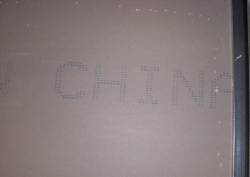BESI Offers Defective Drywall Remediation Protocol That Exceeds CPSC/HUD Interim Guidance and Aligns with the Recent Court Ruling
The recent CPSC/HUD publication of remediation guidelines and the findings of fact & conclusions of law filed by Judge Fallon are no cause for change to the remediation protocol endorsed by the Building Envelope Institute since October 2009.

Gainesville, FL, April 15, 2010 --(PR.com)-- The protocol offered through BESI provides (to-date) the most comprehensive remediation process that was developed based on proven science; and nicknamed the “BESI System” because of the institute’s endorsement. The protocol for remediation of defective drywall being offered by BESI considers the following major factors: corrosion, cross-contamination of other building materials, personal belongings, IAQ monitoring program, a proposed national warranty (not an insurance policy), and removal of the stigma from having defective drywall.
The “Interim Remediation Guidance for Homes with Corrosion from Problem Drywall” was released by the Consumer Product Safety Commission (CPSC) and the Department of Housing and Urban Development (HUD) on April 2, 2010. The institute was not surprised that the protocol they have been endorsing since October 2009 exceeds this guidance. The institute was waiting for a ruling from Judge Fallon in the Chinese manufactured drywall products liability litigation (MDL No. 2047) to know what the court would require for remediation. In Judge Fallon's Findings of Fact & Conclusions of Law filed April 8th, he cited:
“… any system that lacks the ability to definitely identify the offensive drywall is unacceptable and rejected by this Court. The regulatory and scientific record demonstrates that removing all drywall from a mixed drywall home is the only method that ensures this goal is obtained.”
“… the Court finds that scientific, economic, and practicality concerns dictate that the proper remediation for the Plaintiff-intervenors is to remove all drywall in their homes, all items which have suffered corrosion as a result of the Chinese drywall, and all items which will be materially damaged in the process of removal.”
It’s good to know that if your home was remediated under this protocol that it would not require additional work in order to meet the CPSC/HUD interim guidance or to be aligned with the court’s ruling. The Institute has a document that helps explain the protocol called, “The BESI System: Understanding the Protocols for Defective Drywall” which is posted on the website.
The certification program offered through the Institute (BESI) instructs and trains licensed and approved state contractors in the remediation of defective or corrosive drywall. The institute will provide information on other available remediation methods during its training seminar; however, BESI certification is only being offered on the endorsed protocol since the other remediation methods do not require a high standard of training nor do they offer third-party quality control. The Building Envelope Science Institute has a “Nationwide Directory of Members” that currently allows individuals to locate BESI certified inspectors and remediators for defective drywall in their area and compare the services offered by these companies.
The Building Envelope Science Institute (BESI) has been offering certifications for inspection and remediation of defective drywall since October 2009 and is hosting its next seminar on May 3-4, 2010 at the Courtyard Fort Lauderdale Coral Springs located at 620 N. University Drive, Coral Springs, Florida.
To learn more about the Institute or for conference details, go online to www.BESInstitute.org, or contact info@BESInstitute.org.
###
The “Interim Remediation Guidance for Homes with Corrosion from Problem Drywall” was released by the Consumer Product Safety Commission (CPSC) and the Department of Housing and Urban Development (HUD) on April 2, 2010. The institute was not surprised that the protocol they have been endorsing since October 2009 exceeds this guidance. The institute was waiting for a ruling from Judge Fallon in the Chinese manufactured drywall products liability litigation (MDL No. 2047) to know what the court would require for remediation. In Judge Fallon's Findings of Fact & Conclusions of Law filed April 8th, he cited:
“… any system that lacks the ability to definitely identify the offensive drywall is unacceptable and rejected by this Court. The regulatory and scientific record demonstrates that removing all drywall from a mixed drywall home is the only method that ensures this goal is obtained.”
“… the Court finds that scientific, economic, and practicality concerns dictate that the proper remediation for the Plaintiff-intervenors is to remove all drywall in their homes, all items which have suffered corrosion as a result of the Chinese drywall, and all items which will be materially damaged in the process of removal.”
It’s good to know that if your home was remediated under this protocol that it would not require additional work in order to meet the CPSC/HUD interim guidance or to be aligned with the court’s ruling. The Institute has a document that helps explain the protocol called, “The BESI System: Understanding the Protocols for Defective Drywall” which is posted on the website.
The certification program offered through the Institute (BESI) instructs and trains licensed and approved state contractors in the remediation of defective or corrosive drywall. The institute will provide information on other available remediation methods during its training seminar; however, BESI certification is only being offered on the endorsed protocol since the other remediation methods do not require a high standard of training nor do they offer third-party quality control. The Building Envelope Science Institute has a “Nationwide Directory of Members” that currently allows individuals to locate BESI certified inspectors and remediators for defective drywall in their area and compare the services offered by these companies.
The Building Envelope Science Institute (BESI) has been offering certifications for inspection and remediation of defective drywall since October 2009 and is hosting its next seminar on May 3-4, 2010 at the Courtyard Fort Lauderdale Coral Springs located at 620 N. University Drive, Coral Springs, Florida.
To learn more about the Institute or for conference details, go online to www.BESInstitute.org, or contact info@BESInstitute.org.
###
Contact
Building Envelope Science Institute
Richard Shaffer
877-688-BESI
www.BESInstitute.org
Richard Shaffer
877-688-BESI
www.BESInstitute.org
Categories

